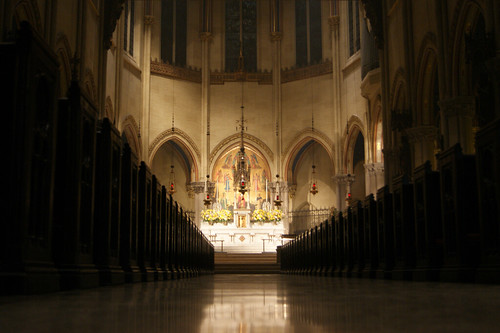The following is a reflection on Hebrews 5:5-10, the Epistle Lesson for the Fifth Sunday in Lent, according to the Revised Standard Lectionary. Hebrews 5:1-10 is the Epistle Lesson for Proper 24B.

The High Altar at the Episcopal Church of St. Mary the Virgin, Times Square, NYC. Photo by Rick Morley.
Abram had been told by God to pick up from his land—the only home he had ever known—and go to a new place.You can’t possibly imagine how big this is unless you’ve ever been among people who are rooted to their land through many generations. This was a big ask. In return, God said he would bless him and make him the father of many nations.
After settling by the Oaks at Mamre he was still childless. So much for “father of nations.” He was in some significant struggles with his nephew, Lot. And, subsequently he found himself in the middle of a grand war.
A war among many kings.
If Abraham’s story stopped there, he would be a laughingstock. A sad laughingstock whose life had been completely turned upside-down by a God who had asked him to move, and who had promised him the world in return. And all he had to show for it was war, strife, and barrenness.
He won the war. And as the kings were settling the tab in comes a new figure. With a name that hadn’t been referenced before, and in the narrative of the Torah wouldn’t be referenced again. A figure that appears and then vanishes again with hardly a comment.
His name is Melchizedek. The name literally means “King of Righteousness.” He’s identified as “The King of Salem.” Of course, “Salem” means “Peace.” He’s also identified as the High Priest of “El Elyon”—or “God Most High.”
And he comes into the valley with the other kings, and he offers bread and wine—and he blesses Abram.
So, this guy is the King of Righteousness and the King of Peace, he’s the High Priest of the God of gods, and he offers blessing and a meal of bread and wine.
Gosh, does any of this sound familiar? Does he sound familiar?
When Abraham is perhaps at his lowest, and his life is spinning out of control, in comes a priest-king with righteousness and peace and a sacramental meal. Unbidden. Un-asked for.
He just comes.
It’s no wonder that centuries and centuries later, in the wake of the death and resurrection of Jesus, that the first Christians identified this priest-king as Jesus. Jesus, they said, wasn’t new. He wasn’t born yesterday. For, there he was ministering to the patriarchs of the Old Testament, bringing the same blessing and the same meal and the same righteousness and peace.
The author of Hebrews isn’t clear on whether or not Jesus and Melchizedek are the same person, but the author is crystal clear that they are cut from the same cloth. Jesus is the High Priest in the Order of Melchizedek.
Some have argued that this order predates the order of the priesthood of Aaron, and therefore it shows superiority over the sacrificial system. In other words, Jesus isn’t anything “new,” he’s actually something much older.
The author of Hebrews may have that in mind, but what I think is also in play, and what I think is far more helpful to us today, is that we’re told here that Jesus is like Melchizedek: when we need him, he just comes. And he comes with peace, and righteousness, and blessing, and the Sacred Meal.
It’s a comfortable image, for sure. It’s comforting to know that when we need Jesus the most, he’ll come riding in to the valley bringing exactly what we need. Even if we forget to ask him to come. Even if we didn’t realize we needed him in the first place.
But, where this image has some teeth is when we consider that WE are baptized and ordained into the same order. The community of the baptized, the Church, is supposed to follow the example of Our Lord and Great High Priest, and we are supposed to show up when people need us. We’re also the ones who come, unbidden, uninvited, and unasked for. We come, and we bring peace and blessing. We come with the Sacrament. We come with righteousness.
And we come in the Name of the God of gods, and Jesus the Christ.
1 Comment